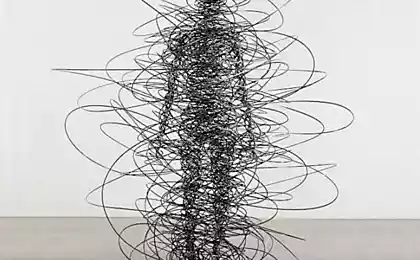526
As loneliness distorts our consciousness: implications of social exclusion
Seven million eight hundred six thousand nine hundred twenty seven
© Yung Cheng Lin
The brain is isolated from contact with other people able to make a strange metamorphosis of his consciousness, — said Michael bond, the author of articles on psychology, human behavior and the book The Power of Others.
Ordinary girl Sarah Shourd about two months spent in Minskoi prison of Tehran: it was heard extraneous steps, saw sparks of light, most of the time she spent on my hands and knees and listened to what goes on behind closed doors. That summer, the 32-year-old girl, accompanied by two of his friends went traveling through the mountains of Iraqi Kurdistan. Reaching the border with Iran, the company was arrested on suspicion of spying and put into custody. Sarah spent about ten thousand hours in solitary confinement, she was haunted by hallucinations. "Peripheral vision, I recorded the flashes of light, but when he turned his head, they immediately lost, — said the girl in an interview with The New York Times in 2011. Once I heard someone screaming. The sound stood in my ears until, until I was led to feelings one friendly guard. It turned out that I cried myself."
All of us from time to time want to be alone, away from the crowds and conversations with colleagues. But the loneliness inside group of people and alone are two different things. For the overwhelming majority of people, prolonged social isolation is detrimental to mental health. We are familiar with this phenomenon not only on the basis of strange stories, but research and experiments on the isolation and social deprivation, many of which failed to complete because of the frightening reactions of the test subjects. Why people are able to lose their mind, left alone, is there a way to avoid insanity in such situations?
Few would argue that isolation is harmful to humans physically. It is known that lonely people are more likely to suffer from high blood pressure, they are more vulnerable to viral infections, in addition they have an increased risk of development of Alzheimer's and dementia. Loneliness affects the well-being — the state of sleep, attention, logical and verbal thinking, is a disorder of the immune system, hormonal imbalance, activates inflammatory processes in the body. What is behind such violations is not clear. Perhaps the reason lies in the evolution for our ancestors to be without the support of tribesmen promised physical danger.
In today's world the rejection of contact with other people entails different kinds of diseases, but the greatest blow accounts of the work of consciousness. Insulation including influences our perception of time. People who have spent a long time without sunlight, noted the effect of the time shift. Mikel Siffre went to a two-week expedition to study an underground glaciers of the French Alps. After some time he found that his consciousness is under the influence of the darkness began to change, and decided to carry out underground for another two months. The researcher left his watch on the outside and lived according to their biological clock. At the end of the experiment, but found that his two subjective minute was equivalent to five minutes of earth time. The same effect of time dilation was observed by the sociologist and caver-lover Maurizio Montalbini. In 1993, he spent 366 days in an underground cave close Pesaro, built by NASA to train astronauts. Maurizio himself was convinced that in his absence, it took only 219 days with a daily cycle has almost doubled. Recent studies have also shown that in the dark, most people readjust to the 48 hour rhythm — 36 hours awake and 12 hours of sleep. The reasons for this phenomenon are still not installed.
In the mid-twentieth century there were many experiments on the social deprivation of the person. In 1950-60-ies it was believed that the Chinese use camera single for "indoctrination" of American prisoners of war captured during the Korean war. Around the same time, the Ministry of defence of the USA and Canada begin to Fund a series of experiments that from the point of view of modern Western ethics seem to be unacceptable. In this series, you can highlight the research of psychologist Donald Hebb, conducted at the medical center at McGill University in Montreal. Scientists have invited volunteers — mostly College students live two to a few weeks in soundproof rooms. The goal was to reduce the physical activity of subjects to the minimum and see their reaction. Subjects were provided with special ammunition, limiting their tactile abilities, glasses, gloves and cardboard cuffs extending to finger-tips, U-shaped absorbent pad that fits over the head. Inside these rooms were air-conditioned, whose noise drowned out any external sounds. After a couple of hours, the volunteers were anxious, they were filled with the desire to regain the ability to feel, they tried to break the monotony of your home away from home, tried to talk, sing or read poetry aloud. Later, many of them began to behave very emotionally and anxiously, isolation affected their intellectual abilities, the ability to solve arithmetic problems and Association tests. The most alarming effects were the hallucinations — lights light, turning into lines, spots and eventually specific visual images like squirrels carrying backpacks over the shoulder, or points of the procession coming down the street. The subjects didn't control the vision: someone imagined the dogs, someone babies. Some experienced auditory hallucinations: the sounds of a barrel organ or choral singing. Other imaginary tactile sensations as if they were shot in the hand or electrocuted. Once in the real world, subjects were not easy to throw off this altered perception of reality. It seemed that the room where they were sitting, in motion, and objects in the world constantly change their shape and size.
Disturbing end
The experiment had to be interrupted previously scheduled due to the inability of students to physically continue testing — no one could survive in such conditions longer than a week. Subsequently, Hebb wrote in American Psychologist that the results were alarming: "it's One thing to read about how the Chinese are "washed" brains of prisoners of war, quite another to witness how deprived of the opportunity to observe, listen and feel people go crazy".
In 2008, clinical psychologist Ian Robbins with the BBC repeated the experiment Hebb. He put six volunteers for 48 hours in a soundproof chamber, former nuclear bunker. The results were similar — the development of anxiety, emotionalism, obsessive thoughts, mental disorders, hallucinations. Why the brain is deprived of tactile sensations the way a person behaves? Cognitive psychologists believe that the part of the brain responsible for the execution of the current task, used to receive and process a large number of coming to senses information. Robbins notes that when the sources disappear, the nervous system continues to transmit signals to the Central processor of the brain, despite the falsity of these signals. The brain in turn tries to interpret them, creating on the basis of integral images. In other words, he is trying to construct peace on the basis of weakly reaching up to his impulses, the result of which creates a fantastic reality.
Such deceptions of the psyche should not surprise us. First, we know that other primates, too, are ill-suited to social exclusion. Harry Harlow, a psychologist at the University of Wisconsin-Madison, decided to study this question in the 1960-ies on the example of rhesus monkeys. Newborn macaques from several months to a year grew alone. They showed anxiety after the 30 days, after years of their capacity for social contacts at any level was practically destroyed. Second, because people learn to recognise their emotions through communication with others. Biologists believe that the cooperation of our ancestors in the distant past contributed to the evolution of sensory experience. The original function of emotions is social. If there is anyone who can share with us the feelings of fear, anger, anxiety or sadness, and to assess their relevance, we will be able to live with a distorted self-concept, irrational perception of the surrounding events and phenomena.
At the moment in the protected prisons in the US are about 25 thousand prisoners. Without social interaction these prisoners have no opportunity to test the reality of their emotions and the adequacy of their thinking, says Terry kupers, a forensic psychiatrist at the California Institute in Berkeley. This is one reason that many people suffer from anxiety, paranoia and obsession. Craig Haney -- a psychologist at the University of California in Santa Cruz and a leading expert on mental health prisoners USA, says that some of them purposefully start an open confrontation with the guards to confirm their existence, to remember who they are.
The strategy of confrontation
Social isolation can destroy the human mind, but there are ways to counter this. Every person copes in their own way — someone better, someone worse. Is there a way to protect yourself if you by chance was in custody? There's no scientific consensus on this question, but let's look at the examples of those who managed to avoid the madness after many years spent alone with him.
When Sarah Shourd arrested in Iran, she was definitely not ready for this. Any person in such a situation the world can turn on its head. He had no one to help, no one to share their experiences. He must find the strength and realize all the difficulties with which he will have to face. To understand how to exist in the new reality.
Hussain al-Shahristani was chief adviser to Saddam Hussein on nuclear issues. He was imprisoned in the prison of Abu Graim near Baghdad after he refused to support the project development of atomic weapons for Iraq. Hussein managed to keep his sanity during 10 years of solitary confinement, he has trained his brain by solving mathematical puzzles for himself and wrote. Today he works as a Deputy Minister of energy of Iraq. This method used during your 7-year stay in the thrall of the Hungarian Communist government Edith Bon, doctor of medical Sciences and translator. She has designed scores of pieces of stale bread and fingered in mind the vocabulary of the six languages which he had mastered himself.
Members of military organizations suffer isolation is relatively easier. Keron Fletcher, a psychiatrist consultant who works with former voennoplennye suggests that the detention and interrogation which he was subjected during his service in the Royal air force, well prepared to make their own conclusions. "You learn the basics of resistance, he says. — In addition, you believe that your friends and colleagues turned inside-out to release you. In my opinion, the military people are less apt to succumb to despair in a difficult situation. A sense of hopelessness and helplessness can play a cruel joke with you, they undermine the morale and the will to live".
Us Senator John McCain has shown by example that the military mind gives a psychological advantage in this matter. Five and a half years he spent in prison in Vietnam, only strengthened his spirit. About two years of his imprisonment he says: "Solitary confinement is a terrible thing. They suppress your spirit and weaken the ability to resist stronger than any other form of cruelty... Despair engulfs you immediately. It is your main enemy for the period of confinement."
Extreme reality
Forty one million fifty one thousand nine hundred sixty nine
Psychologists who study how people cope with the effects of isolation, learned a lot from the experience of explorers and climbers. For many adventure lovers, voluntarily alienated from society, being in contact with nature may provide an effective substitute for personal communication. Norwegian psychologist Gro Sandal of the University of Bergen in Norway conducted a survey of a group of travelers about how they cope in extreme conditions alone, and noted that the ability to accept the situation is the main method of solving this problem. "Then they feel safer, feel less alone". The same psychological phenomenon explains why the shipwrecked and thrown on desert island sailors appear imaginary friends, and sometimes groups of imaginary companions with whom they are trying to do it alone. Such madness is simply a defense mechanism. As in the story of a sailor Ellen MacArthur and her trimaran, nicknamed Mobi. During your circumnavigation in 2005, the girl sent letters to friends with the caption "love e and Mobi". In their public records on the Internet, she used the pronoun "we" instead of "I".
It is difficult to find a more vivid illustration of the power of loneliness that can overwhelm one person and to liberate other than the story of Bernard, Moitessier and Donald Crowhurst, two participants of the regatta round-the-world Sunday Times Golden Globe 1968. The main prize that time took Robin Knox-Johnson, the only one of the nine participants reached the finish line. His solo voyage lasted 331 days. Matisse, austere French, throughout his journey to do yoga and feed the puffins, having taken him to the stern, he so enjoyed the process that the idea of returning to civilization had become alien to him. I rowed once around the earth, he landed on the island of Tahiti: "I spend all my time at sea because I'm happy here — he wilted. Perhaps it's to save my soul." The second participant, Crowhurst, feeling miserable from the beginning. He left England is not enough prepared to the event and from the very beginning sent false reports of their whereabouts. Aimlessly drifting for several months off the coast of South America, his depression and loneliness only intensified. In the end he locked himself in his cabin, wrote predsmertnuyu the note, and jumped overboard. His body was never found.
What are we to make of these stories of confrontation and desperation? Obviously, we lose a lot of energy, they find themselves outside of society. Insulation, according to the writer Thomas Carlyle, is the basis of unhappiness. However, there are more optimistic estimates, which are not less true — we can always stay sane, even when alone, if we can find solace beyond the boundaries of self. You should always be ready and be able to persevere. However, never underestimate the power of our imagination, knocking at the walls of the single cells, penetrate icy caves and introduces us to fictional friends. published
P. S. And remember, just changing your mind — together we change the world! ©
Source: theoryandpractice.ru
© Yung Cheng Lin
The brain is isolated from contact with other people able to make a strange metamorphosis of his consciousness, — said Michael bond, the author of articles on psychology, human behavior and the book The Power of Others.
Ordinary girl Sarah Shourd about two months spent in Minskoi prison of Tehran: it was heard extraneous steps, saw sparks of light, most of the time she spent on my hands and knees and listened to what goes on behind closed doors. That summer, the 32-year-old girl, accompanied by two of his friends went traveling through the mountains of Iraqi Kurdistan. Reaching the border with Iran, the company was arrested on suspicion of spying and put into custody. Sarah spent about ten thousand hours in solitary confinement, she was haunted by hallucinations. "Peripheral vision, I recorded the flashes of light, but when he turned his head, they immediately lost, — said the girl in an interview with The New York Times in 2011. Once I heard someone screaming. The sound stood in my ears until, until I was led to feelings one friendly guard. It turned out that I cried myself."
All of us from time to time want to be alone, away from the crowds and conversations with colleagues. But the loneliness inside group of people and alone are two different things. For the overwhelming majority of people, prolonged social isolation is detrimental to mental health. We are familiar with this phenomenon not only on the basis of strange stories, but research and experiments on the isolation and social deprivation, many of which failed to complete because of the frightening reactions of the test subjects. Why people are able to lose their mind, left alone, is there a way to avoid insanity in such situations?
Few would argue that isolation is harmful to humans physically. It is known that lonely people are more likely to suffer from high blood pressure, they are more vulnerable to viral infections, in addition they have an increased risk of development of Alzheimer's and dementia. Loneliness affects the well-being — the state of sleep, attention, logical and verbal thinking, is a disorder of the immune system, hormonal imbalance, activates inflammatory processes in the body. What is behind such violations is not clear. Perhaps the reason lies in the evolution for our ancestors to be without the support of tribesmen promised physical danger.
In today's world the rejection of contact with other people entails different kinds of diseases, but the greatest blow accounts of the work of consciousness. Insulation including influences our perception of time. People who have spent a long time without sunlight, noted the effect of the time shift. Mikel Siffre went to a two-week expedition to study an underground glaciers of the French Alps. After some time he found that his consciousness is under the influence of the darkness began to change, and decided to carry out underground for another two months. The researcher left his watch on the outside and lived according to their biological clock. At the end of the experiment, but found that his two subjective minute was equivalent to five minutes of earth time. The same effect of time dilation was observed by the sociologist and caver-lover Maurizio Montalbini. In 1993, he spent 366 days in an underground cave close Pesaro, built by NASA to train astronauts. Maurizio himself was convinced that in his absence, it took only 219 days with a daily cycle has almost doubled. Recent studies have also shown that in the dark, most people readjust to the 48 hour rhythm — 36 hours awake and 12 hours of sleep. The reasons for this phenomenon are still not installed.
In the mid-twentieth century there were many experiments on the social deprivation of the person. In 1950-60-ies it was believed that the Chinese use camera single for "indoctrination" of American prisoners of war captured during the Korean war. Around the same time, the Ministry of defence of the USA and Canada begin to Fund a series of experiments that from the point of view of modern Western ethics seem to be unacceptable. In this series, you can highlight the research of psychologist Donald Hebb, conducted at the medical center at McGill University in Montreal. Scientists have invited volunteers — mostly College students live two to a few weeks in soundproof rooms. The goal was to reduce the physical activity of subjects to the minimum and see their reaction. Subjects were provided with special ammunition, limiting their tactile abilities, glasses, gloves and cardboard cuffs extending to finger-tips, U-shaped absorbent pad that fits over the head. Inside these rooms were air-conditioned, whose noise drowned out any external sounds. After a couple of hours, the volunteers were anxious, they were filled with the desire to regain the ability to feel, they tried to break the monotony of your home away from home, tried to talk, sing or read poetry aloud. Later, many of them began to behave very emotionally and anxiously, isolation affected their intellectual abilities, the ability to solve arithmetic problems and Association tests. The most alarming effects were the hallucinations — lights light, turning into lines, spots and eventually specific visual images like squirrels carrying backpacks over the shoulder, or points of the procession coming down the street. The subjects didn't control the vision: someone imagined the dogs, someone babies. Some experienced auditory hallucinations: the sounds of a barrel organ or choral singing. Other imaginary tactile sensations as if they were shot in the hand or electrocuted. Once in the real world, subjects were not easy to throw off this altered perception of reality. It seemed that the room where they were sitting, in motion, and objects in the world constantly change their shape and size.
Disturbing end
The experiment had to be interrupted previously scheduled due to the inability of students to physically continue testing — no one could survive in such conditions longer than a week. Subsequently, Hebb wrote in American Psychologist that the results were alarming: "it's One thing to read about how the Chinese are "washed" brains of prisoners of war, quite another to witness how deprived of the opportunity to observe, listen and feel people go crazy".
In 2008, clinical psychologist Ian Robbins with the BBC repeated the experiment Hebb. He put six volunteers for 48 hours in a soundproof chamber, former nuclear bunker. The results were similar — the development of anxiety, emotionalism, obsessive thoughts, mental disorders, hallucinations. Why the brain is deprived of tactile sensations the way a person behaves? Cognitive psychologists believe that the part of the brain responsible for the execution of the current task, used to receive and process a large number of coming to senses information. Robbins notes that when the sources disappear, the nervous system continues to transmit signals to the Central processor of the brain, despite the falsity of these signals. The brain in turn tries to interpret them, creating on the basis of integral images. In other words, he is trying to construct peace on the basis of weakly reaching up to his impulses, the result of which creates a fantastic reality.
Such deceptions of the psyche should not surprise us. First, we know that other primates, too, are ill-suited to social exclusion. Harry Harlow, a psychologist at the University of Wisconsin-Madison, decided to study this question in the 1960-ies on the example of rhesus monkeys. Newborn macaques from several months to a year grew alone. They showed anxiety after the 30 days, after years of their capacity for social contacts at any level was practically destroyed. Second, because people learn to recognise their emotions through communication with others. Biologists believe that the cooperation of our ancestors in the distant past contributed to the evolution of sensory experience. The original function of emotions is social. If there is anyone who can share with us the feelings of fear, anger, anxiety or sadness, and to assess their relevance, we will be able to live with a distorted self-concept, irrational perception of the surrounding events and phenomena.
At the moment in the protected prisons in the US are about 25 thousand prisoners. Without social interaction these prisoners have no opportunity to test the reality of their emotions and the adequacy of their thinking, says Terry kupers, a forensic psychiatrist at the California Institute in Berkeley. This is one reason that many people suffer from anxiety, paranoia and obsession. Craig Haney -- a psychologist at the University of California in Santa Cruz and a leading expert on mental health prisoners USA, says that some of them purposefully start an open confrontation with the guards to confirm their existence, to remember who they are.
The strategy of confrontation
Social isolation can destroy the human mind, but there are ways to counter this. Every person copes in their own way — someone better, someone worse. Is there a way to protect yourself if you by chance was in custody? There's no scientific consensus on this question, but let's look at the examples of those who managed to avoid the madness after many years spent alone with him.
When Sarah Shourd arrested in Iran, she was definitely not ready for this. Any person in such a situation the world can turn on its head. He had no one to help, no one to share their experiences. He must find the strength and realize all the difficulties with which he will have to face. To understand how to exist in the new reality.
Hussain al-Shahristani was chief adviser to Saddam Hussein on nuclear issues. He was imprisoned in the prison of Abu Graim near Baghdad after he refused to support the project development of atomic weapons for Iraq. Hussein managed to keep his sanity during 10 years of solitary confinement, he has trained his brain by solving mathematical puzzles for himself and wrote. Today he works as a Deputy Minister of energy of Iraq. This method used during your 7-year stay in the thrall of the Hungarian Communist government Edith Bon, doctor of medical Sciences and translator. She has designed scores of pieces of stale bread and fingered in mind the vocabulary of the six languages which he had mastered himself.
Members of military organizations suffer isolation is relatively easier. Keron Fletcher, a psychiatrist consultant who works with former voennoplennye suggests that the detention and interrogation which he was subjected during his service in the Royal air force, well prepared to make their own conclusions. "You learn the basics of resistance, he says. — In addition, you believe that your friends and colleagues turned inside-out to release you. In my opinion, the military people are less apt to succumb to despair in a difficult situation. A sense of hopelessness and helplessness can play a cruel joke with you, they undermine the morale and the will to live".
Us Senator John McCain has shown by example that the military mind gives a psychological advantage in this matter. Five and a half years he spent in prison in Vietnam, only strengthened his spirit. About two years of his imprisonment he says: "Solitary confinement is a terrible thing. They suppress your spirit and weaken the ability to resist stronger than any other form of cruelty... Despair engulfs you immediately. It is your main enemy for the period of confinement."
Extreme reality
Forty one million fifty one thousand nine hundred sixty nine
Psychologists who study how people cope with the effects of isolation, learned a lot from the experience of explorers and climbers. For many adventure lovers, voluntarily alienated from society, being in contact with nature may provide an effective substitute for personal communication. Norwegian psychologist Gro Sandal of the University of Bergen in Norway conducted a survey of a group of travelers about how they cope in extreme conditions alone, and noted that the ability to accept the situation is the main method of solving this problem. "Then they feel safer, feel less alone". The same psychological phenomenon explains why the shipwrecked and thrown on desert island sailors appear imaginary friends, and sometimes groups of imaginary companions with whom they are trying to do it alone. Such madness is simply a defense mechanism. As in the story of a sailor Ellen MacArthur and her trimaran, nicknamed Mobi. During your circumnavigation in 2005, the girl sent letters to friends with the caption "love e and Mobi". In their public records on the Internet, she used the pronoun "we" instead of "I".
It is difficult to find a more vivid illustration of the power of loneliness that can overwhelm one person and to liberate other than the story of Bernard, Moitessier and Donald Crowhurst, two participants of the regatta round-the-world Sunday Times Golden Globe 1968. The main prize that time took Robin Knox-Johnson, the only one of the nine participants reached the finish line. His solo voyage lasted 331 days. Matisse, austere French, throughout his journey to do yoga and feed the puffins, having taken him to the stern, he so enjoyed the process that the idea of returning to civilization had become alien to him. I rowed once around the earth, he landed on the island of Tahiti: "I spend all my time at sea because I'm happy here — he wilted. Perhaps it's to save my soul." The second participant, Crowhurst, feeling miserable from the beginning. He left England is not enough prepared to the event and from the very beginning sent false reports of their whereabouts. Aimlessly drifting for several months off the coast of South America, his depression and loneliness only intensified. In the end he locked himself in his cabin, wrote predsmertnuyu the note, and jumped overboard. His body was never found.
What are we to make of these stories of confrontation and desperation? Obviously, we lose a lot of energy, they find themselves outside of society. Insulation, according to the writer Thomas Carlyle, is the basis of unhappiness. However, there are more optimistic estimates, which are not less true — we can always stay sane, even when alone, if we can find solace beyond the boundaries of self. You should always be ready and be able to persevere. However, never underestimate the power of our imagination, knocking at the walls of the single cells, penetrate icy caves and introduces us to fictional friends. published
P. S. And remember, just changing your mind — together we change the world! ©
Source: theoryandpractice.ru























